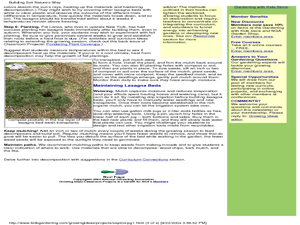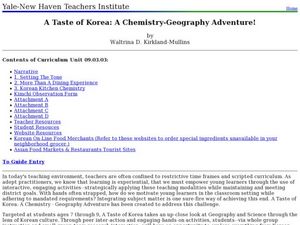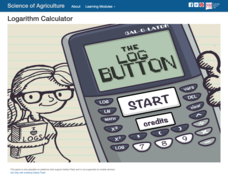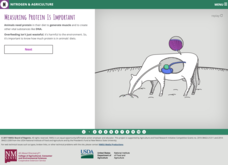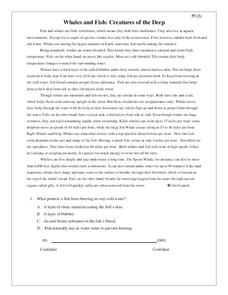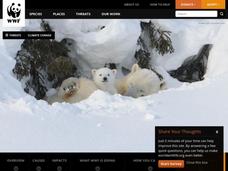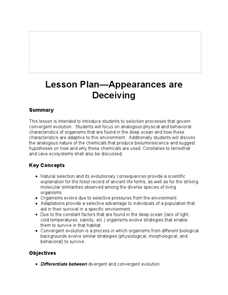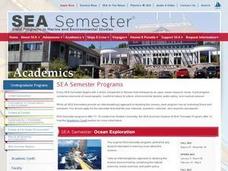Curated OER
Where is Sophie?
Learners use GPS to scrutinize the movements of a grizzly bear named Sophie. They answer a series of questions like; where she forages, her zone of influence, and human interaction. They read the story of Sophie, the collared bear in...
Curated OER
Building Soil Nature's Way: Exploring decomposition and soil health
Students explore decomposition and soil health by creating their own garden. In this agriculture lesson, students build a "lasagna garden" with organic matter found in the area and plant perennials native to their region. Students are...
Curated OER
A Taste of Korea: A Chemistry-Geography Adventure
Students explore the different aspects of Korean culture. In this geography instructional activity, students prepare different Korean dishes in the classroom. They create a visual display of things they learned about Korean culture.
Michigan State University
Create an Animal
Think beyond the animals and habitats we've already discovered and allow scholars to dream up their very own habitat and an animal that lives there. Class members present the new habitat and animal on a poster alongside an...
Polar Trec
Calorimetry Lab
Young people between the ages of 11–13 need on average about 2,000 calories per day. Within the lab, groups learn about calorimetry and respiration. They explore how it pertains to humans and animals living the Arctic where cold...
Learning Games Lab
Scientific Graph Reading
Interpreting graphs is an essential skill for young scientists. An interactive online lesson gives individuals an opportunity to review the components of a graph and learn to read and interpret the shape of a graph. The lesson includes...
Learning Games Lab
The Magic of Reading Graphs
Making conclusions from graphs doesn't need to seem like magic. Learners explore an interactive lesson on reading graphs to strengthen their skills. The content discusses how to read the axes of a graph and draw conclusions based on the...
Learning Games Lab
Logarithm Calculator
Support your young scientists' knowledge of logarithms with a quick video lesson. The instruction first presents the relationship between a base-10 logarithm and an exponential equation. It then demonstrates how to use a calculator to...
Curated OER
EEEK! A Spider!
Youngsters complete a unit of lessons based on the story "Little Miss Muffet." They predict what will happen in the story, and use context clues to look for meaning in the words. They research information about spiders using the Internet...
Curated OER
Color the Snow
Are your teaching in a cold and snowy environment? If so, then try out this fun activity with your class. You mix a variety of colors in large jars to show learners the difference between primary and secondary colors, then let them mix...
Curated OER
Earth Day Unit Plan: Pollution in the Anacostia River - Biology Teaching Thesis
Sixth graders are able to explain that there are pollutants in the Anacostia River, what these pollutants can cause, and how to prevent further pollution. They examine the impacts that the pollutants of the Anacostia River could have on...
Learning Games Lab
Nitrogen in Feed
Knowing what farmers are feeding livestock is just smart business. A WebQuest lesson helps learners build an understanding of the relationship between amino acids, nitrogen, and protein. With interactive instruction, scholars practice...
Learning Games Lab
Nitrogen in Fertilizer
Nitrogen is an essential element for productive farming. An interactive lesson explores the chemical makeup of different fertilizers and their corresponding nitrogen content. The interactive challenges individuals to complete molecular...
Learning Games Lab
Nitrogen in Pollutants
Responsible farming is important for maintaining natural resources. Eager scientists complete a WebQuest to explore what happens to nitrogen when it enters the soil. They learn about the chemical makeup of nitrogen-based molecules and...
Conserve Wildlife Foundation of New Jersey
The Great Peregrine Scavenger Hunt - On the Internet
The story of one bird provides valuable insight into general animal behaviors and interactions. Young researchers investigate the peregrine falcon using a web search. They analyze the behaviors of the raptor including its migration...
Curated OER
Forest Habitat Fragmentation
Seventh graders discuss the loss of animal habitats and the importance of refuge areas for them. They collect small pictures of animals found in their state and glue them to an outline of their state according to their range. Finally,...
Curated OER
Whales and Fish: Creatures of the Deep
Practice comparing and contrasting details in informational text with a reading passage about whales. It explains the ways that fish and whales are similar, as well as the ways they are different, and specific characteristics of various...
Curated OER
Rainforest Rescue
Students explore threats to diversity in the Central African rainforest. They use a guided website to research animals that are threatened with extinction, examine human uses of the rainforest and think about what they can do to help...
Curated OER
Climate Change And Disease
Students consider the role of climate change in the occurrence of vector born diseases such as malaria. In small groups, they research a specific vector to complete an information chart on climate changes in the region where the vector...
Curated OER
Lesson Plan - Appearances are Deceiving
Herre is a lesson on divergent and convergent evolution. It has links to terrific video clips, an associate worksheet, and more. The analysis questions have been reviewed separately on Lesson Planet if you would like more information....
Curated OER
Asthma and Allergies
Your health class reads two biographical stories: one about a girl who has allergies and the other about a girl who has asthma. They watch a quick cartoon on the KidsHealth website about immunity and take the related online quiz. You...
Curated OER
Waters of the Earth
Students make a striking visual display showing the distribution of water on earth.
Curated OER
2nd Grade - Act. 25: Creature Creation
Create a creature using some of the characteristics of a real animal. Second graders will read a book from the "Froggy," series by Johnathan London to learn about the characteristics of frogs. After discussing and recording various...
Curated OER
Wetland Metaphors
Learners describe the characteristics of wetlands and identify their ecological functions. They inspect items and use them to create metaphors about wetlands.
Other popular searches
- Science Project Food Apples
- Science Project Food Chain
- Science Project Food Waste
- Science Project Food Rice
- Food Science Fair Projects
- Science Project Food Decay
- Science Projects Food Chain



